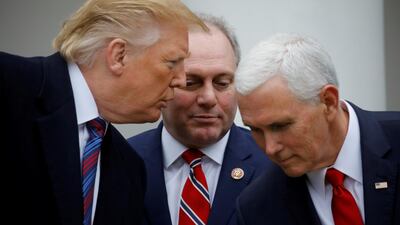If you’ve found the Donald Trump presidency tumultuous thus far, brace yourself – 2019 is likely to include numerous turning points with profound implications for both US domestic politics and foreign policy.
As a Democratic majority takes control of the House of Representatives, Mr Trump will face a set of challenges for which he seems completely unprepared.
Republicans controlled all branches of US government for the past two years, but did extremely little with that rare opportunity. In addition to some judicial appointments and deregulation, their sole major “achievement” was an indefensible and highly unpopular tax cut for corporations and the wealthy.
That’s all.
They didn't even manage to repeal or replace the increasingly popular Obamacare health law.
Now Democrats and Republicans can block each other legislatively almost completely.
With the Democrats controlling the House and Republicans the Senate, and the constant prospect of a presidential veto, any new legislation must be acceptable to both parties.
This checkmate was in full effect even before the transfer of power in the House. The ongoing partial federal government shutdown illustrates the gridlock and bitter confrontation we can expect from now on.
Engineering the shutdown was hardly irrational, and it's easy to see what the president thinks he's doing.
He gets to rain on the House Democrats’ parade and start them off mired in a governance crisis, rather than anything positive.
Moreover, he’s forced the conversation on to the topic that best distinguishes him from most other major US political leaders, and that he believes delivered him the White House and control of the Republican Party: immigration and, implicitly, white Christian communal power.
But the risks are obvious and grave.
It's much easier to blame a single person than several hundred, especially when Mr Trump deliberately initiated the shutdown after publicly promising to take responsibility for it.
The president now blames the Democrats but current polling indicates that most voters blame him.
But while Mr Trump clearly feels the “the wall” and associated racial issues propelled him to power, he evidently fears that if he can't make any progress on building it, his base may turn on him, sinking his chances for re-election.
He doesn't want to back down and "look foolish", and therefore insists the deadlock could drag on for weeks if not months.
Yet the president has painted himself into a tight corner, with little wiggle room or leverage.
While the wall gives him a more clear-cut single issue than the House Democrats have, it is not a popular one.
Most Americans know the idea is idiotic. Empty bluster about "national security" and “terrorism” won't change that, so it’s hard to see how he can win the stand-off.
Starting this week Democrats will use House committee powers to investigate Mr Trump and his associates, and there’s plenty to scrutinise.
The grand jury for Robert Mueller's probe has just been extended, probably for six more months, but his work will likely conclude in 2019.
The dozen criminal investigations into the president and his associates are almost certain to result in major indictments, and, if the evidence is damning enough, raise the prospect of impeachment.
As I have repeatedly noted, Mr Trump is trying to deinstitutionalise American politics, raising his personal stature above conventional norms and accountability.
But with a Democratic House exercising the constitutionally mandated oversight Republicans carefully avoided, and several key investigations concluding in 2019, Mr Trump's bluff will be called.
Republican leaders will then be forced to choose between political and personal loyalty to the president, versus upholding traditional standards for the rule of law, constitutional accountability and the independent authority of national institutions.
US democracy itself would be at stake in such a pivotal confluence of contradictions.
With rare exceptions, most Republicans have slavishly kowtowed to Mr Trump. But there are indications, especially Mitt Romney's damning broadside in The Washington Post, that some conservative Republicans sense an emerging opportunity to push back.
In foreign policy, internationalist Democrats and Republicans will keep pushing Mr Trump towards a more conventional approach to US global leadership, but he has purged his administration of anyone who might effectively champion that from within.
The war in Yemen will be a key issue in Congress. That should be another crucial reminder that Gulf Arab countries need to ensure their relationships with Washington don’t become partisan political footballs, and that current enhanced partnerships are not perceived as a Trumpian mistake.
The urgent need for them to reach out to Democrats and internationalist Republicans has been evident for over a year, and it should be clearer now than ever.
In 2019 Republican leaders will finally have to make the fateful choices they have been so carefully avoiding between Mr Trump's personal interests and the rule of law and democratic accountability.
And the country at large must continue to confront a yawning gulf between US national interests in global leadership and a strong, growing public antipathy to that role, given that the political establishment hasn't convinced ordinary Americans it's good for them.
Already, 2019 looks like a pivotal year for Washington's foreign policy and, especially, the US political system and its embattled institutions.
Hussein Ibish is a senior resident scholar at the Arab Gulf States Institute in Washington


